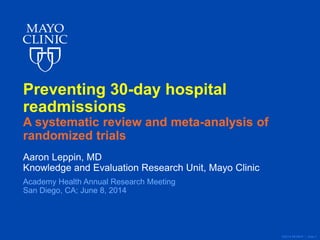leppina
- 1. ©2014 MFMER | slide-1
Preventing 30-day hospital
readmissions
A systematic review and meta-analysis of
randomized trials
Aaron Leppin, MD
Knowledge and Evaluation Research Unit, Mayo Clinic
Academy Health Annual Research Meeting
San Diego, CA; June 8, 2014
- 3. ©2014 MFMER | slide-3
Background
• Reducing readmissions requires better
understanding of causes
• Patient appraisal of need is key
• Depends on perception of resources
• Hospital is a source of capacity
• Recently discharged patients have low capacity
for self-care1
1Krumholz, N Engl J Med. 2013.
- 4. ©2014 MFMER | slide-4
The Cumulative Complexity Model
Shippee, J Clin Epidemiol., 2012
- 5. ©2014 MFMER | slide-5
Hypothesis
When burdensome and
insufficiently supported
demands are placed on
patients and caregivers
post-discharge, it will
overwhelm capacity and
lead to readmission
May, Montori, and Mair; BMJ. 2009.
- 6. ©2014 MFMER | slide-6
Objectives
• To synthesize RCT evidence of discharge
interventions in reducing 30-day readmissions
• To explore the characteristics of these
interventions that are most associated with their
effectiveness
- 7. ©2014 MFMER | slide-7
Methods
Data Sources and Study Selection
• Database search from 1990 to April 1, 2013
• Reviewed bibliographies, expert contacts
• Eligibility Criteria
• Randomized trials of any discharge
intervention
• Assessing risk of unplanned or all-cause
readmission within 30-days with or without
out of hospital deaths
• Patients admitted >24 hours for med/surg
diagnosis and discharged to home
- 8. ©2014 MFMER | slide-8
Methods
Data Extraction and Synthesis
• Extracted patient, intervention, and outcome
characteristics
• Used activity-based coding strategy to “de-
bundle” interventions and confirmed with
authors
• Blinded raters evaluated “net intervention”
descriptions to judge impact on patient
workload and capacity
- 9. ©2014 MFMER | slide-9
Methods
Activity-based Coding Strategy
• Discharge planning
• Case management
• Telephone follow-up
• Telemonitoring
• Patient education
• Self-management
• Medication intervention
• Home visits
• Follow-up scheduled
• Pt-centered discharge
instructions
• Provider continuity
• Timely follow-up
• PCP communication
• Patient hotline
• Rehab intervention
• Streamlining
• Making requisite
• Other
- 10. ©2014 MFMER | slide-10
Methods
Identifying Net Interventions
CONTROLINTERVENTION
Discharge planning
Telephone follow-up
Discharge planning
Telephone follow-up
Patient education
NET INTERVENTION
Patient education
- 11. ©2014 MFMER | slide-11
Methods
Intervention Capacity/Workload Ratings
IncreaseDecrease No Change
- 12. ©2014 MFMER | slide-12
Methods
Data Analysis
• Random effects meta-analysis of relative risks
of readmission in 30-days
• Planned, exploratory subgroup analyses of
patient, intervention, and outcome
characteristics
• Post-hoc regression model assessing value of
“comprehensive support” in reducing 30-day
readmissions
- 13. ©2014 MFMER | slide-13
Results
Trial identification and Meta-analysis
• 47 randomized trials; 18 providing previously
unpublished data
• 42 reported patient-level rates
• Pooled RR: 0.82 (95% CI 0.73 to 0.91)
• P<.001
• I2=31%
• 5 reported event numbers only
• Pooled RR: 0.93 (95% CI 0.72 to 1.20)
• P=.59
• I2=23%
- 14. ©2014 MFMER | slide-14
Results
Subgroup analyses
Intervention characteristics with significant
interactions for reducing 30 day readmission
rates
• Rated to increase patient capacity (P=.04)
• Delivered by two or more individuals (P=.05)
• Comprised five or more activities (P=.001)
• Study published prior to 2002 (P=.01)
- 15. ©2014 MFMER | slide-15
Results
Meta-regression: Comprehensive support
• Variable scores from 0 to 4; 1 point each for:
• Rated to increase patient capacity
• Five or more meaningful patient interactions
• Two or more humans involved in delivery
• Five or more intervention activities
• Summed scores3 categories
• Category 1: 0 points
• Category 2: 1-2 points
• Category 3: 3-4 points
- 16. ©2014 MFMER | slide-16
Results
Regression effects of comprehensive support
Study
Characteristic
Number of
Studies
RR of
Readmission
Compared to
Reference
95%
Confidence
Interval
p value
Category 1 15 1 (reference)
Category 2 20 0.82 0.66 to 1.02 0.07
Category 3 7 0.63 0.43 to 0.91 0.02
Publication in
2002 or after
33 1.47 1.10 to 1.96 0.01
- 17. ©2014 MFMER | slide-17
Results
Category 3 Interventions:
“consistent and complex strategy that
emphasized the assessment and addressing of
factors related to patient context and capacity for
self-care (including the impact of comorbidities,
functional status, caregiver capabilities,
socioeconomic factors, potential for self-
management, and patient and caregiver goals for
care). These interventions coordinated care
across the inpatient-to-outpatient transition and
involved multiple patient interactions; all but 1
involved patient home visits.”
Leppin, JAMA Internal Medicine, 2014
- 18. ©2014 MFMER | slide-18
Strengths/Limitations
• Largest and most homogenous collection of
randomized trial evidence
• Hypothesis-generating work
• Evidence of publication bias
• Workload and capacity ratings were global
assessments; no validated or criterion-based
scale
- 19. ©2014 MFMER | slide-19
Conclusions and Implications
• A comprehensive and complex strategy that
fully supports patients post-discharge has
shown consistent value (many report cost
savings)
• Recent meta-analysis in heart failure is
complementary; stresses value of home visits1
• Many interventions currently being tested do not
follow this strategy and are less effective
1Feltner, Annals of Internal Medicine, 2014
- 20. ©2014 MFMER | slide-20
Acknowledgements
• Michael R. Gionfriddo,
PharmD
• Maya Kessler, MD
• Juan Pablo Brito, MBBS
• Frances S. Mair, MD
• Katie Gallacher, MBChB
• Zhen Wang, Phd
• Patricia J. Erwin, MLS
• Tanya Sylvester, BS
• Kasey Boehmer, BS
• Henry H. Ting, MD, MBA
• M. Hassan Murad, MD
• Nathan D. Shippee, PhD
• Victor M. Montori, MD
- 21. ©2014 MFMER | slide-21
Thank you for your attention!
Leppin.Aaron@mayo.edu
www.minimallydisruptivemedicine.org
Leppin AL, Gionfriddo MR, Kessler M, et al. Preventing 30-Day
Hospital Readmissions: A Systematic Review and Meta-analysis of
Randomized Trials. JAMA Intern Med. Published online May 12,
2014. doi:10.1001/jamainternmed.2014.1608.
Hinweis der Redaktion
- Other relevant models are Lazarus’ transactional model of stress
- I call this the “touch” variable
